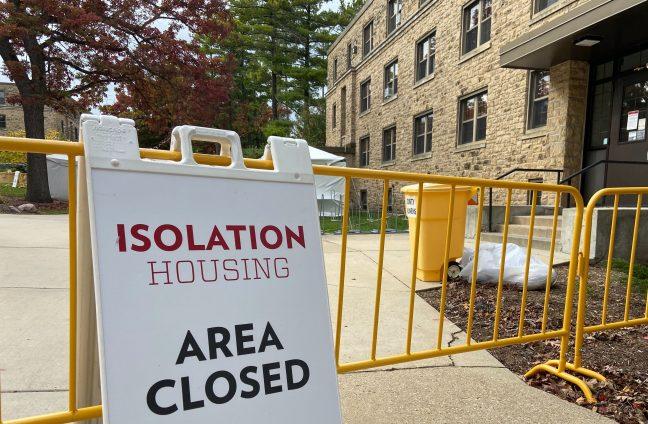The University of Wisconsin formed the new Coronavirus Student Task Force in November for increased student involvement in the administration’s decision-making process in regards to COVID-19.
The task force, which acts as a student advisory group for UW administrators, comprises 12 students organized through the Associated Students of Madison, according to Channel 3000. The group is chaired by ASM Vice Chair Aerin Leigh Lammers.
In an email statement to The Badger Herald, Lammers said the task force is collaborating with various administrators to give recommendations on what would most benefit students’ academic success and physical and mental health.
Lammers said shared governance is an “important fundamental right” for UW students so they can participate in the campus’ decision-making process.
“Over the summer most students were at home and unable to provide feedback on how COVID was handled, with this new committee we will be able to comment and have input on decisions being made,” Lammers said. “A lot of it does depend on how much administration is willing to listen, but we hope they will take student concerns seriously and adjust plans based on our input.”
Sharing governance: Student leaders question UW’s representation of the student body
In an email statement to The Badger Herald, ASM representative on the task force Emma Cline said she looks forward to a discussion on clear messaging between the university and students.
Cline said she plans on ensuring students — particularly off-campus students — are provided with clear and concise updates by the UW administration on their expectations for safety and health.
“In Madison, I struggled to find any other student living off-campus [who] had a clear understanding of what the university was looking for as a standard for testing, gatherings, etc.,” Cline said in the statement.
In a statement to The Badger Herald, Vice Chancellor for Student Affairs Lori Reesor said the task force is an advisory board that was created based on student feedback for a “more formalized” way for UW’s student population to have an input in campus decisions and policies related to COVID-19.
Reesor said the group will provide advice to the UW administration for the campus’ COVID-19 response for the spring semester.
“Students were selected to be part of the advisory group by an application process to ensure diverse representation and viewpoints,” Reesor said. “It includes students and housefellows in University Housing, international students, fraternity and sorority life, historically underrepresented students and more.”
The group first met in November and will meet weekly, Reesor said. Reesor said some topics the task force will discuss include COVID-19 testing, contact tracing, incentives for participation, a smartphone app, use of technology and student-centered marketing and communications.
Teaching Assistants Association President Alejandra Canales said she has not heard of the student task force before and is “skeptical” about how it will hold UW administrators more accountable or ensure larger student representation in their decision-making process in an email statement to The Herald.
Canales said she is unsure if the task force includes graduate students but considers it a “huge red flag” that UW administrators did not contact TAA.
“I think that graduate students want to see UW-Madison take our health and safety concerns seriously. Over the summer, I heard TAs express that they were uncomfortable with in-person instruction, and as coronavirus cases increased and community spread worsened, I continued to hear the same thing,” Canales said. “Virtual instruction should be the default until it is safe and that should not come at the expense of pay continuity for other campus workers.”
‘Money’s just tough:’ students employed in campus area share how pandemic has impacted pay
So far, Lammers said the group has met only once to discuss an overview of the plan for the spring semester to determine the main priorities of the group. After surveying the task force’s members on what they want the group to focus on, Lammers said there was an “overwhelming” response to discuss the phone application that will be utilized in the testing regime.
Cline said in her statement that the testing regime and app are modeled off of University of Illinois at Urbana-Champaign’s response.
Both Cline and Lammers said the task force will release an anonymous form for students to share their grievances and ideas for how to keep students safe next semester.
Canales said she hopes the task force will implement systems-level solutions.
“Up until Thanksgiving — well after Wisconsin became nationally known for its high COVID cases per capita and Dane County contact tracing efforts were overwhelmed — classes were still being held in-person,” Canales said. “As much as administrators want to pretend otherwise, UW-Madison’s decisions with respect to COVID-19 affect the entire city.”
This article was updated at 10:30 a.m. CST to reflect a statement to The Badger Herald from TAA President Alejandra Canales.














